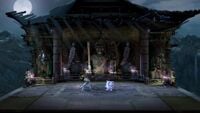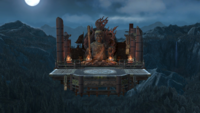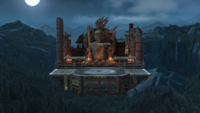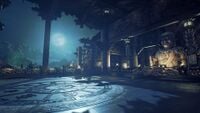Mishima Dojo: Difference between revisions
(→Trivia: Assuming the cameo is so brief it hardly counts as an appearance, Persona Q2predates Joker's reveal in Ultimate.) |
(Persona Q2 was released in Japan before Smash →Trivia) |
||
| Line 64: | Line 64: | ||
==Trivia== | ==Trivia== | ||
*Mishima Dojo is one of four stages in the ''Super Smash Bros.'' series to originate from a fighting game other than ''Smash'' itself, with the others being [[Suzaku Castle]], [[King of Fighters Stadium]], and [[Spring Stadium]]. | *Mishima Dojo is one of four stages in the ''Super Smash Bros.'' series to originate from a fighting game other than ''Smash'' itself, with the others being [[Suzaku Castle]], [[King of Fighters Stadium]], and [[Spring Stadium]]. | ||
*Mishima Dojo is the | *Mishima Dojo is the first stage which did not appear on Nintendo hardware before its debut in the ''Super Smash Bros.'' series. | ||
{{SSBUStages}} | {{SSBUStages}} | ||
Revision as of 23:27, July 7, 2021
| Tekken 7 Mishima Dojo | |
|---|---|
File:SSBU-Tekken stage.png Mishima Dojo in Super Smash Bros. Ultimate. | |
| Universe | Tekken |
| Appears in | Ultimate |
| Availability | Downloadable |
| Crate type | Normal |
| Maximum players | 8 |
Mishima Dojo (三島道場, Mishima Dojo) is a downloadable stage in Super Smash Bros. Ultimate, based on the location of the same name from the Tekken series. It is the home stage of Kazuya, and is bundled with him as part of Challenger Pack 10.
Stage overview
The stage's layout is primarily flat, with walls and ceiling sections blocking the left, right and upper blast zones. These can be broken by being attacked or if a fighter is launched into them, with a Special Zoom usually occurring in the latter event. After being broken, they will repair themselves after a certain amount of time has passed. Heihachi Mishima can be seen in front of the large Fudō Myōō statue in the center of the stage, sitting faced away from the action with his arms crossed. When the fighters hit the walls and ceiling, he'll react to it by looking left and right, depending on which walls and ceilings fighters hit. He'll get up, cross up his arms and react to KOs once parts of the walls and ceilings are broken. He does not appear in the background in 8-player battles.
There is a small inscription on the floor that roughly translates to Kazumi and Heihachi. This is a reference to Tekken lore, where both carved their names into the floor as a symbol of their love.
Ω form and Battlefield form
For the Ω form and Battlefield form, the walls and ceiling are permanently broken and the stage now floats far above the surface, and thus the stage's ledge walls do not extend below the blast line. The stage is also resized and reshaped to match Final Destination and Battlefield, respectively. The three soft platforms of the Battlefield form are wooden and resemble the wood flooring of the main platform.
Origin
The stage is designed around the Mishima Dojo as it appears in Tekken 7. While the walls and ceiling can not break in Mishima Dojo, they are able to in other Tekken stages. On the floor of the stage, it is possible to see the names of Heihachi and his deceased wife Kazumi Hachijo, which were engraved by them when they first fell in love. This detail is present in the original appearance of Mishima Dojo in Tekken 7, and originates from another similar stage in Tekken 2, Pagoda Temple.
Gallery
Kazuya with Mario.
Kazuya using Jump Side Kick against Captain Falcon on Mishima Dojo.
Names in other languages
Trivia
- Mishima Dojo is one of four stages in the Super Smash Bros. series to originate from a fighting game other than Smash itself, with the others being Suzaku Castle, King of Fighters Stadium, and Spring Stadium.
- Mishima Dojo is the first stage which did not appear on Nintendo hardware before its debut in the Super Smash Bros. series.
|
| |
|---|---|
| Fighter | Kazuya (SSBU) |
| Stage | Mishima Dojo |
| Other | Heihachi Mishima |
| Spirits | Spirits |
| Music | Ultimate |











